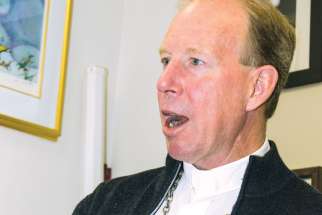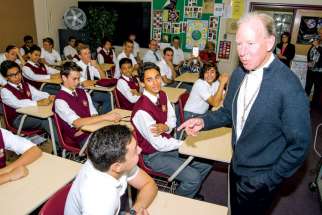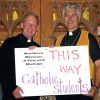You can’t take the mission priest out of Bishop Gordon
New Victoria bishop encourages a stint in Canada’s north for priests before ministering on Vancouver Island
Jesus found on the periphery, bishop tells students
TORONTO - Look to the peripheries for it is there you’ll find the suffering, the marginalized and Jesus Christ.
Two bishops tell students tales of Catholic life up North
TORONTO - The urban youth from Canada’s largest city got a crash course in northern life with the visit of two bishops who experience Canada’s far north every day.
Bishop Murray Chatlain of the Mackenzie-Fort diocese and Whitehorse Bishop Gary Gordon were in Toronto in late September and early October to raise awareness of the financial and physical hardships of their missions in the northern territories. The bishops were on a tour organized by Catholic Missions In Canada.
During an Oct. 1 presentation in collaboration with Ryerson University’s chaplaincy, Chatlain shared pictures of a rotting church in Fort Simpson, N.W.T. He told the small crowd in St. Michael’s Parish Hall that the Catholic community in Fort Simpson has raised $80,000 over the last three years to repair the church. But the total costs will run about $500,000.
“The Catholic community in Fort Simpson has not lost hope because they know they’re going to get some financial help from Catholic Missions In Canada,” said Chatlain. “They hope for a new church in a year or two.”
Another major cost for both bishops is travel expenses. Chatlain’s diocese covers 1.5 million square kilometres, the largest geographical diocese in the world. He flies 75 per cent of the time to reach different communities and a return trip costs $2,300 every time.
To reach all the communi
ties of his diocese in the Yukon, Gordon drives his truck about 35,000 km every year. He is able to fill the truck with gas with the funding from the Catholic Missions.
“The bottom line is we wouldn’t be where we are if it weren’t for the Catholic Missions In Canada,” said Gordon.
Catholic Missions was founded in 1908 and was first known as the Catholic Church Extension Society of Canada. Its main mission today is to help catechists and expand faith growth in hard to reach communities across Canada. Many First Nations communities in the Canadian territories are among the missions in need.
Gordon explains that some towns in his diocese are so far away from a more urban setting, such as Whitehorse, that there will be no priest to serve the Catholic community for months.
“The First Nations people do not want a hand out but they want a hand up,” said Gordon. “We are at a time of transition of finding people with the vision of the Church who have sense and ability to be the hand up.”
Chatlain added that the missions need as much as help as they can get from Catholic teachers, medical personnel and laypeople. His diocese serves 38 communities with huge distances between each.
Educating other people about First Nations was emphasized by both bishops. They visited high schools in the Toronto area to talk about the climate challenges and emotional problems such as alcohol abuse, violence and high suicide rates within First Nations’ communities.
“The First Nations people are people of the land. They don’t want huge communities and their people have lived on that land for thousands of years. It is the land where their ancestors are buried and family is so important to them,” said Chatlain.
Chatlain also mentioned that student groups from London, Ont’s King’s College volunteer for one month in one northern diocese. And for the past two years, the National Evangelization Team (NET) from Ottawa has been bringing young adults to volunteer for eight months. The volunteers get to know the people, join youth gatherings and visit the smaller communities spread across the diocese.
Potential volunteers can also contact the diocese by phone or e-mail, and it is advisable to have a reference from a priest ready. The diocese works out a time frame that someone is available to volunteer and plans around that schedule.
“God calls a certain type of person to work up North. It takes openness to the different ways the First Nations work. It is a trust thing,” said Chatlain.
(Jereza, 18, is a second-year journalism student at Ryerson University in Toronto.)




